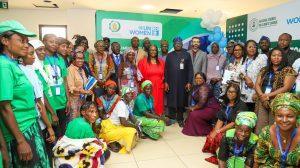UN Women and the Islamic Organisation for Food Security (IOFS) have underscored women’s inclusion and access to land and other developmental infrastructure as key in the Cassava Value Chain production for the economic growth of the nation.
This was made known in Abuja, Nigeria’s capital, at the National Stakeholder Debriefing & Consultation Meeting on Cassava Value Chain, to review progress and lessons learned within the cassava value chain.
Speaking, the UN Women Country Representative to Nigeria and ECOWAS, Ms Beatrice Eyong, emphasised that women play a critical role in the cassava value chain but have been marginalised in production infrastructure, hence the need to address the trend.
“Today, we focus on cassava, a crop that is not only climate-resilient but also central to women’s livelihoods. Women are the backbone of cassava processing, yet they bear the greatest weight of climate change and unpaid care work.
“By turning Cassava’s potential into opportunity, we can shift heavy labour into profitable entrepreneurship, create decent green jobs, and drive inclusive, sustainable growth for our communities and our country.”

She lamented that women in cassava value chains remain trapped in low-income, labour-intensive roles with limited returns.
” Women lack access to improved seedlings, modern processing equipment, credit facilities, and secure markets, factors that reduce efficiency and limit their ability to scale.
“In many cases, women process cassava manually, spending long hours in unsafe conditions with minimal financial gain. These barriers reinforce poverty cycles and exclude women from the higher-value segments of the cassava economy”.
According to her, smart technology plays a great role in making leaders in the cassava value chain.
“This initiative seeks to change that story. By equipping women with climate-smart technologies, access to microfinance and cooperatives, and linkages to formal markets, we will open pathways for women to move from subsistence to enterprise.
“With targeted training, supportive policies, and investments in infrastructure such as mechanised processing centres and renewable energy solutions, women can become leaders in the cassava value chain—driving innovation, resilience, and economic empowerment”, she noted

Ms Eyong, further reaffirmed UN Women’s commitment to ensure women are leaders in food security and climate resilience “This initiative recognises that resilience is not possible when women spend up to 12 hours daily on unpaid care work. That is why we are combining skills development with investments in energy, water, and time-saving infrastructure, enabling women to be more productive, earn more, and expand their opportunities.
“At UN Women, we know from experience that when women farmers are supported with the right tools, policies, and resources, they lift entire households and communities.
“Through this partnership with the Islamic Organisation for Food Security (IOFS), we reaffirm our mandate to ensure women are not just beneficiaries, but leaders in food security and climate resilience”, she said
She added that with collective efforts, policies needed to protect their roles will be strengthened.
“Our collective call to action is clear: let us work together to expand women’s access to climate-smart technologies, finance, and markets; to strengthen the policies that recognise and protect their roles; and to create green jobs that secure a more equitable and resilient future for Nigeria,” she added.
On his part, the permanent secretary of Nigeria’s Ministry of Agriculture and Food Security, Dr Marcus Ogunbiyi, maintained that women are vital to agricultural development in society; hence, there was a need for collaboration from all stakeholders in ensuring the inclusiveness of women in key decision-making in the cassava value chain.
On his part, the lead consultant in the Islamic Organisation for Food Security, IOFS, Dr William Agyei-Manu, called for actionable strategies to strengthen food security, enhance gender inclusion, and promote sustainable agricultural development in Nigeria.
“For IOFS, it is the beginning of a new phase of joint action. We are fully committed to: Supporting national partners in developing gender-responsive cassava strategies and policy frameworks that integrate women and youth at every stage of the value chain; Facilitating partnerships between government institutions, research centres, and financial entities to improve access to technology, finance, and infrastructure.
“Investing in capacity building and common-user processing facilities, ensuring women farmers and processors can move from subsistence to entrepreneurship; Leveraging regional cooperation through the Organisation of Islamic Cooperation (OIC) to share innovations, strengthen trade, and replicate successful models across member states”, he said
The Representatives from the Women Affairs Ministry, the NEXIM bank, GIZ and the FCT Women Affairs Secretariat maintained that the inclusion of women and accessibility to technology and infrastructure in the cassava value chain would greatly enhance livelihood and develop the country.
Please find original version of article below:
https://von.gov.ng/un-women-iofs-highlight-womens-role-in-cassava-production/






